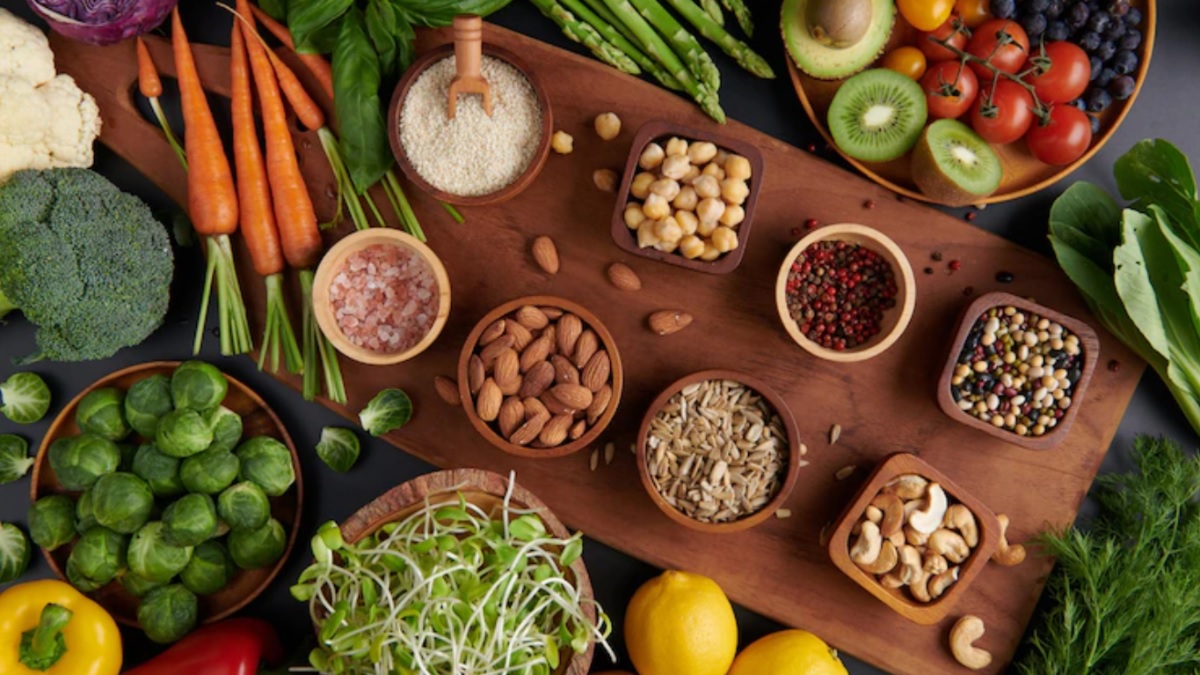Incorporating a variety of nuts, seeds, and vegetables into your diet is key to promoting optimal health and well-being. These nutrient-rich foods provide essential vitamins, minerals, fiber, and antioxidants that support heart health, digestive health, and overall vitality. Regular consumption can also help manage weight, reduce the risk of chronic diseases, and enhance longevity. Including nuts, seeds, and vegetables in your meals offers a delicious and convenient way to nourish your body and fuel your day with essential nutrients.
The health benefits of nuts and seeds are widely recognized, offering a wealth of nutrients and promoting overall well-being.
Vegetables are an indispensable part of a healthy diet, offering a multitude of health benefits that support overall well-being and vitality.
11–15: Nuts and seeds
Although nuts and seeds are rich in unsaturated fat and calories, they can potentially reduce the risk of cardiovascular disease, cancer, and various health concerns. Serving as a satisfying snack, they might aid individuals in weight management efforts.
Moreover, nuts and seeds demand minimal preparation, facilitating their incorporation into daily routines. Additionally, they can enhance the texture of salads and other culinary creations.
Nonetheless, it’s imperative to note that individuals with nut allergies should avoid consuming them.
11. Almonds
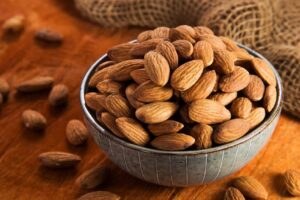
Almonds, often regarded as a superfood, boast an impressive array of health benefits. Packed with nutrients, they contribute to overall well-being in various ways. Rich in healthy fats, fiber, protein, vitamins, and minerals, almonds offer a wholesome addition to any diet.
Consumption of almonds has been associated with enhanced cardiovascular well-being. Their high content of monounsaturated fats and antioxidants may help lower levels of bad cholesterol (LDL) while raising levels of good cholesterol (HDL), reducing the risk of heart disease. Furthermore, almonds contain magnesium, which plays a crucial role in regulating blood pressure and maintaining cardiovascular health.
Moreover, almonds are known to support weight management efforts. Despite being energy-dense, their combination of protein, fiber, and healthy fats promotes feelings of fullness and satiety, potentially reducing overall calorie intake throughout the day.
Almonds also offer benefits for blood sugar control. Their low glycemic index and high fiber content help stabilize blood sugar levels, making them a suitable snack option for individuals with diabetes or those aiming to prevent insulin resistance.
Additionally, almonds are beneficial for bone health due to their rich calcium content. Incorporating almonds into the diet may contribute to strengthening bones and reducing the risk of osteoporosis.
Furthermore, almonds contain antioxidants like vitamin E, which help combat oxidative stress and inflammation in the body, potentially reducing the risk of chronic diseases such as cancer and Alzheimer’s disease.
In conclusion, almonds stand out as a nutritious and versatile food that can positively impact various aspects of health, including heart health, weight management, blood sugar control, bone health, and antioxidant protection. Incorporating almonds into a balanced diet can be a delicious and beneficial way to support overall well-being.
12. Chia seeds
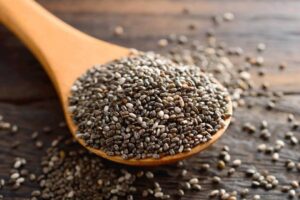
Chia seeds have gained popularity as a superfood due to their impressive nutritional profile and potential health benefits. These tiny seeds are packed with nutrients and are particularly rich in fiber, omega-3 fatty acids, protein, vitamins, and minerals.
One of the key health benefits associated with chia seeds is their ability to promote heart health. The omega-3 fatty acids found in chia seeds, specifically alpha-linolenic acid (ALA), have been linked to a reduced risk of heart disease. ALA helps lower levels of LDL cholesterol (the “bad” cholesterol) while increasing levels of HDL cholesterol (the “good” cholesterol), thereby supporting cardiovascular health.
Chia seeds are also beneficial for digestive health due to their high fiber content. Fiber promotes regular bowel movements, prevents constipation, and supports a healthy digestive system overall. Additionally, the gel-like consistency that forms when chia seeds are mixed with liquids can help keep stools soft and aid in the passage of food through the digestive tract.
Moreover, chia seeds are a good source of plant-based protein, making them an excellent addition to vegetarian and vegan diets. Protein is essential for muscle repair and growth, as well as for maintaining overall health and vitality.
Furthermore, chia seeds abound in antioxidants, aiding in shielding the body from oxidative stress and inflammation. These compounds may contribute to a reduced risk of chronic diseases such as cancer and heart disease.
Adding chia seeds to your diet is straightforward and adaptable. They can be sprinkled on top of yogurt or oatmeal, added to smoothies, used as a thickening agent in soups and sauces, or even used to make chia pudding.
In conclusion, chia seeds are a nutrient-dense superfood that offers numerous health benefits, including improved heart health, enhanced digestion, increased protein intake, and antioxidant protection. Adding chia seeds to your diet can be a simple and delicious way to support overall health and well-being.
13. Coconuts
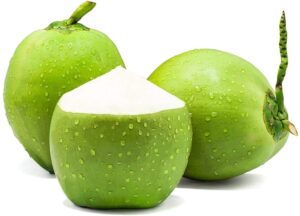
Coconuts are renowned for their versatile applications and numerous health benefits. From the refreshing water found inside the fruit to the rich, creamy texture of its flesh and the oil extracted from it, every part of the coconut offers something valuable.
Coconut water, for instance, is not only a delicious beverage but also a natural source of electrolytes, making it an excellent option for hydration, particularly after physical activity. It contains potassium, magnesium, and other essential minerals, helping replenish electrolytes lost through sweat and promoting overall hydration.
The flesh of the coconut is rich in healthy fats, particularly medium-chain triglycerides (MCTs), which are easily metabolized by the body for energy. MCTs have been associated with various health benefits, including improved cognitive function, increased energy expenditure, and weight management.
Coconut oil, extracted from the flesh of mature coconuts, has gained popularity for its diverse uses and potential health benefits. It is high in saturated fats, but these fats consist mainly of lauric acid, which has been shown to raise levels of beneficial HDL cholesterol in the blood, thereby supporting heart health. Moreover, coconut oil exhibits antimicrobial properties and may help combat infections caused by bacteria, viruses, and fungi.
In addition to its nutritional value, coconut is a versatile ingredient in cooking and baking. Its flour, milk, and oil can be used in various recipes, from savory dishes to desserts, adding a unique flavor and texture to meals.
While coconuts offer numerous health benefits, it’s essential to consume them in moderation, especially considering their high saturated fat content. However, when incorporated sensibly into a balanced diet, coconuts can be a delicious and nutritious addition, contributing to overall health and well-being.
14. Macadamia nuts

Macadamia nuts, revered for their rich, buttery flavor and creamy texture, are not just a delicious snack but also offer numerous health benefits. These nuts are packed with monounsaturated fats, which have been associated with improved heart health by helping to lower levels of LDL cholesterol while increasing levels of HDL cholesterol, promoting a healthy lipid profile. Additionally, macadamia nuts contain antioxidants like vitamin E and flavonoids, which help combat oxidative stress and inflammation, reducing the risk of chronic diseases such as heart disease and cancer. Furthermore, they are a good source of fiber, protein, and various essential minerals such as magnesium, manganese, and copper, which are vital for overall health and well-being. Incorporating macadamia nuts into your diet can be a delicious and nutritious way to support heart health, reduce inflammation, and provide essential nutrients to the body. However, it’s essential to consume them in moderation due to their high calorie and fat content.
15. Walnuts
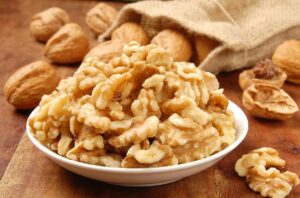
Walnuts are renowned for their distinct flavor and numerous health benefits. These nutrient-packed nuts are rich in omega-3 fatty acids, specifically alpha-linolenic acid (ALA), which is essential for heart health. Consumption of walnuts has been linked to reduced cholesterol levels, improved blood vessel function, and lowered blood pressure, all of which contribute to a healthier cardiovascular system. Additionally, walnuts are a good source of antioxidants, such as polyphenols and vitamin E, which help combat oxidative stress and inflammation in the body, potentially reducing the risk of chronic diseases like heart disease and cancer. Furthermore, walnuts are high in protein, fiber, and various vitamins and minerals, including magnesium and manganese, which support overall health and well-being. Incorporating walnuts into your diet can be as simple as adding them to salads, oatmeal, or yogurt, or enjoying them as a satisfying snack on their own. Nonetheless, it’s crucial to moderate their consumption because of their calorie density. Including walnuts as part of a balanced diet can provide numerous health benefits and contribute to your overall well-being.
16. Brazil nuts

Brazil nuts are renowned for their rich taste and numerous health benefits. These large nuts are an excellent source of selenium, a mineral essential for various bodily functions, including thyroid function, immune system health, and antioxidant activity. Just one Brazil nut provides more than 100% of the recommended daily intake of selenium, making them one of the richest dietary sources of this nutrient. Selenium is crucial for thyroid hormone metabolism and has been linked to improved cognitive function and a reduced risk of certain cancers.
Additionally, Brazil nuts contain other essential nutrients, including magnesium, phosphorus, and vitamin E, which contribute to overall health and well-being. Their high content of healthy fats, particularly monounsaturated fats, may help lower LDL cholesterol levels and reduce the risk of heart disease. Moreover, Brazil nuts provide ample protein and fiber, rendering them a gratifying and nourishing choice for snacking.
Nonetheless, it’s crucial to exercise moderation in consuming Brazil nuts because of their elevated selenium levels. Excessive intake of selenium can lead to selenium toxicity, which may cause symptoms such as nausea, vomiting, and hair loss. Incorporating a few Brazil nuts into your diet each day can provide valuable nutrients and support overall health, but it’s important not to overindulge. As with any food, moderation is key to reaping the benefits without risking negative effects on health.
17–26: Vegetables
In terms of calories, vegetables stand out as one of the most nutrient-dense options available. Incorporating a diverse selection of vegetables into your diet guarantees a broad spectrum of essential nutrients.
Vegetables are nutritional powerhouses, offering a dense array of essential nutrients per calorie. Incorporating a diverse selection of vegetables into your diet ensures you receive a broad spectrum of vitamins, minerals, and antioxidants crucial for optimal health. By enjoying a variety of vegetables, you can maximize your nutrient intake and support overall well-being.
17. Asparagus
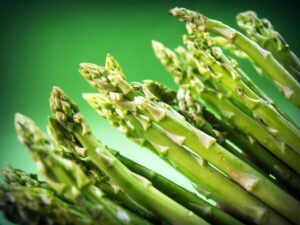
Asparagus, celebrated for its delicate flavor and crisp texture, is not only a culinary delight but also a nutritional powerhouse. This vibrant green vegetable is rich in vitamins, minerals, and antioxidants, making it a valuable addition to any diet.
Asparagus is an excellent source of folate, a B-vitamin essential for DNA synthesis and cell division. Sufficient folate consumption is especially crucial during pregnancy as it aids in fetal development and lowers the likelihood of neural tube defects.
Furthermore, asparagus is loaded with vitamin K, which plays a crucial role in blood clotting and bone health. Consuming foods rich in vitamin K, such as asparagus, can help maintain strong and healthy bones.
Additionally, asparagus is rich in antioxidants, including vitamin C and beta-carotene, which help combat oxidative stress and inflammation in the body. These antioxidants contribute to overall health and may reduce the risk of chronic diseases like heart disease and cancer.
Moreover, asparagus is a good source of fiber, which supports digestive health by promoting regular bowel movements and feeding beneficial gut bacteria.
Incorporating asparagus into your diet is simple and versatile. It can be steamed, roasted, grilled, or sautéed and makes a delicious addition to salads, pasta dishes, omelets, and more.
In conclusion, asparagus is not only a delicious vegetable but also a nutritional powerhouse, offering a wealth of vitamins, minerals, and antioxidants that promote overall health and well-being. Including asparagus in your diet can provide numerous health benefits and add variety and flavor to your meals.
18. Bell peppers

Bell peppers, with their vibrant colors and crisp texture, are not just a culinary delight but also a nutritional powerhouse. These versatile vegetables are rich in vitamins, minerals, and antioxidants, making them an excellent addition to any diet.
Bell peppers contain more vitamin C than many citrus fruits. Vitamin C plays a crucial role in supporting immune function, maintaining skin health, and facilitating wound healing. Additionally, it functions as an antioxidant, shielding cells from harm inflicted by detrimental free radicals.
Vitamin C stands out as a prominent nutrient present in bell peppers. In fact, bell peppers are also a good source of vitamin A, which is important for eye health, immune function, and skin health. Additionally, they contain vitamin B6, which plays a role in brain development and function, as well as folate, which is crucial for fetal development during pregnancy.
Moreover, bell peppers are rich in antioxidants, such as carotenoids and flavonoids, which have anti-inflammatory and disease-fighting properties. These antioxidants help protect against chronic diseases like heart disease, cancer, and diabetes.
Moreover, bell peppers boast a low-calorie content and high fiber content, rendering them an excellent option for promoting weight management and supporting digestive health. They can be enjoyed raw in salads, sliced and dipped in hummus, or cooked in stir-fries, soups, and stews.
In conclusion, bell peppers are not only delicious but also incredibly nutritious. Including them in your diet can provide a wide range of health benefits, including boosted immunity, improved eye health, and reduced risk of chronic diseases. So next time you’re planning your meals, don’t forget to add some colorful bell peppers to the mix!
19. Broccoli
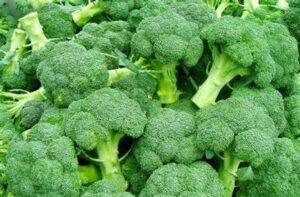
Broccoli is a green vegetable that is packed with essential nutrients and health benefits. Rich in vitamins, minerals, and antioxidants, broccoli is renowned for its potential to boost overall health and well-being. One of its standout features is its high vitamin C content, which supports the immune system and helps the body fight off infections and diseases. Additionally, broccoli contains significant amounts of vitamin K, which is essential for bone health and blood clotting.
Moreover, broccoli is a good source of fiber, aiding in digestion and promoting a healthy gut. Its high fiber content also contributes to feelings of fullness, which can be beneficial for weight management. Furthermore, broccoli is loaded with antioxidants like sulforaphane, which may help reduce inflammation and lower the risk of chronic diseases such as heart disease and certain types of cancer.
Incorporating broccoli into your diet can be easy and versatile. It can be enjoyed steamed, roasted, stir-fried, or even eaten raw in salads. By including broccoli in your meals regularly, you can reap its numerous health benefits and contribute to a balanced and nutritious diet.
20. Carrots

Carrots are vibrant orange vegetables known for their distinct sweet flavor and numerous health benefits. Packed with essential nutrients like beta-carotene, fiber, vitamin K1, potassium, and antioxidants, carrots offer a range of advantages for overall health and well-being. Beta-carotene, a precursor to vitamin A, is particularly abundant in carrots and is crucial for maintaining healthy vision, skin, and immune function.
The fiber found in carrots contributes to digestive wellness by encouraging regular bowel movements and helping to prevent constipation. Additionally, the antioxidants found in carrots, such as lutein and zeaxanthin, may help reduce the risk of chronic diseases like heart disease and certain cancers by combating oxidative stress and inflammation in the body.
Carrots are also low in calories and high in water content, making them an excellent choice for weight management and hydration. Their natural sweetness makes them a satisfying and nutritious snack option that can help curb cravings for unhealthy foods.
Incorporating carrots into your diet is easy, as they can be enjoyed raw as a crunchy snack, cooked in soups, stews, and stir-fries, or even juiced for a refreshing beverage. By including carrots in your regular meals and snacks, you can take advantage of their numerous health benefits and contribute to a balanced and nutritious diet.
21. Cauliflower
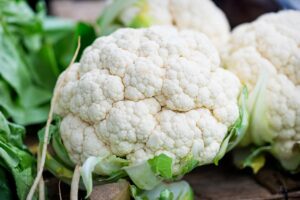
Cauliflower is a cruciferous vegetable that boasts an array of health benefits, making it a valuable addition to any diet. Rich in vitamins, minerals, and antioxidants, cauliflower offers numerous advantages for overall well-being. It is particularly notable for its high vitamin C content, which supports the immune system and promotes collagen production for healthy skin.
Additionally, cauliflower is a good source of fiber, which aids in digestion and helps maintain regular bowel movements. Its fiber content also contributes to feelings of fullness, making it beneficial for weight management and appetite control. Furthermore, cauliflower contains compounds like sulforaphane and glucosinolates, which have been linked to potential anti-inflammatory and cancer-fighting properties.
Moreover, cauliflower is low in calories and carbohydrates, making it suitable for various dietary preferences, including low-carb and keto diets. It is also incredibly versatile and can be enjoyed raw, steamed, roasted, mashed, or even as a substitute for grains in dishes like cauliflower rice or cauliflower pizza crust.
Incorporating cauliflower into your meals provides a delicious and nutritious way to support overall health and well-being. Whether enjoyed as a side dish, added to salads, or used as a base for creative recipes, cauliflower offers a wealth of benefits for a balanced and wholesome diet.
22. Cucumber

Cucumber is a refreshing and hydrating vegetable that offers several health benefits. With its high water content and low calorie count, cucumber is an excellent choice for staying hydrated and aiding in weight management. Additionally, cucumbers are rich in nutrients such as vitamin K, potassium, and antioxidants like flavonoids and tannins.
One of the most notable health benefits of cucumbers is their ability to promote hydration. With over 95% water content, cucumbers help replenish fluids in the body, support proper digestion, and contribute to overall hydration levels. This makes them an ideal snack for staying refreshed, especially during hot weather or after physical activity.
Furthermore, cucumbers contain antioxidants that may help reduce inflammation, lower the risk of chronic diseases, and promote heart health. The presence of vitamin K supports bone health and may reduce the risk of osteoporosis. Additionally, cucumbers contain compounds like cucurbitacins, which may have potential anti-cancer properties.
Cucumbers are incredibly versatile and can be enjoyed in various ways, including sliced in salads, added to sandwiches, or infused in water for a refreshing beverage. Their mild flavor and crisp texture make them a popular ingredient in a wide range of dishes, contributing both flavor and nutrition. By incorporating cucumbers into your diet regularly, you can enjoy their hydrating properties and numerous health benefits while adding a delicious crunch to your meals.
23. Garlic

Garlic, often referred to as nature’s wonder drug, is renowned for its potent medicinal properties and culinary versatility. Packed with powerful compounds like allicin, garlic has been used for centuries to promote health and well-being. One of its most well-known benefits is its ability to boost the immune system, helping the body fight off infections and illnesses.
Moreover, garlic is rich in antioxidants that help combat oxidative stress and reduce the risk of chronic diseases such as heart disease and certain types of cancer. Its anti-inflammatory properties may also contribute to overall heart health by lowering blood pressure and cholesterol levels.
Furthermore, garlic has antimicrobial properties that can help fight off bacteria, viruses, and fungi, making it a natural remedy for common ailments like the common cold and flu. Additionally, it has been shown to promote gut health by supporting the growth of beneficial bacteria in the digestive system.
Adding garlic to your meals is simple and enjoyable. Whether raw, cooked, or as a supplement, garlic adds depth of flavor to a wide range of dishes, from soups and stir-fries to sauces and marinades. By incorporating garlic into your meals regularly, you can enjoy its numerous health benefits while adding a burst of flavor to your culinary creations.
24. Kale
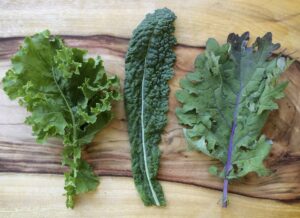
Kale, a nutrient-dense leafy green vegetable, is celebrated for its exceptional health benefits and versatility in culinary creations. Packed with vitamins, minerals, and antioxidants, kale is a powerhouse of nutrition. Its high vitamin K content supports bone health and aids in blood clotting, while its abundant vitamin C content boosts the immune system and promotes collagen production for healthy skin.
Furthermore, kale is rich in antioxidants like flavonoids and carotenoids, which help protect against oxidative stress and inflammation, reducing the risk of chronic diseases such as heart disease and certain cancers. Its impressive fiber content supports digestive health, promoting regular bowel movements and aiding in weight management by inducing feelings of fullness.
Moreover, kale is a rich source of iron, calcium, and magnesium, essential minerals that play vital roles in various bodily functions, including oxygen transport, bone health, and muscle function. Its versatility in the kitchen allows it to be enjoyed raw in salads, sautéed as a side dish, blended into smoothies, or even baked into crispy chips.
Incorporating kale into your diet can elevate your nutrition and contribute to overall health and well-being. Whether used as a standalone ingredient or combined with other nutritious foods, kale offers a plethora of health benefits, making it a valuable addition to any balanced diet.
25. Onions
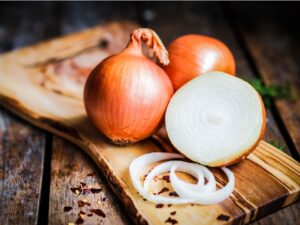
Onions, known for their distinct flavor and culinary versatility, offer a host of health benefits as well. Rich in essential nutrients such as vitamins C and B6, onions contribute to overall well-being. Their potent antioxidants, including flavonoids and sulfur compounds, have been associated with reduced inflammation and protection against chronic diseases like heart disease and cancer.
Moreover, onions contain prebiotic fibers that promote the growth of beneficial gut bacteria, supporting digestive health and enhancing nutrient absorption. Additionally, their sulfur compounds have antimicrobial properties, aiding in the body’s defense against infections.
Low in calories and high in flavor, onions are a valuable addition to a balanced diet. Whether raw in salads, caramelized in savory dishes, or incorporated into soups and stews, onions not only enhance taste but also offer a myriad of health benefits. Including onions regularly in meals can be a flavorful and nutritious way to support overall health and well-being.
26. Tomatoes

Tomatoes are renowned for their vibrant color, rich flavor, and numerous health benefits. Packed with essential nutrients like vitamins C and K, potassium, and antioxidants such as lycopene, tomatoes offer a variety of advantages for overall well-being. Lycopene, in particular, is a powerful antioxidant that has been linked to a reduced risk of chronic diseases, including heart disease and certain types of cancer.
Moreover, tomatoes are low in calories and rich in water content, making them an excellent choice for hydration and weight management. Their high fiber content supports digestive health by promoting regular bowel movements and reducing the risk of constipation.
Furthermore, tomatoes are a rich source of vitamins and minerals that support immune function, bone health, and skin health. Their versatility in cooking allows them to be enjoyed in a multitude of dishes, whether raw in salads, cooked in sauces, or roasted in soups and stews.
Incorporating tomatoes into your diet can be a delicious and nutritious way to enhance meals while reaping their numerous health benefits. Whether fresh, canned, or cooked, tomatoes offer a burst of flavor and a wealth of nutrients that contribute to overall health and well-being.
More healthy vegetables
It’s worth noting other vegetables such as artichokes, Brussels sprouts, cabbage, celery, eggplant, leeks, lettuce, mushrooms, radishes, squash, Swiss chard, collard greens, turnips, and zucchini.
In conclusion, the health benefits of these 10 superfoods are truly remarkable.
In summary, the undeniable health benefits of integrating nuts, seeds, and vegetables into one’s diet are evident.
In conclusion, the substantial evidence supporting the health benefits of nuts and seeds underscores their significance in promoting overall well-being. Regular consumption of these nutrient-rich foods can contribute to improved heart health, weight management, and reduced risk of chronic diseases, making them valuable additions to a balanced diet. Incorporating nuts and seeds into daily meals offers a delicious and convenient way to enhance nutritional intake and support long-term health goals.
Similarly, the extensive array of health benefits offered by vegetables highlights their pivotal role in maintaining optimal health and vitality. Rich in essential nutrients, fiber, and antioxidants, vegetables contribute to various aspects of well-being, including heart health, digestive health, and immune function. Incorporating a diverse range of vegetables into daily meals can help reduce the risk of chronic diseases, promote healthy weight management, and support overall longevity. Embracing vegetables as a cornerstone of a balanced diet empowers individuals to nourish their bodies, enhance their health, and thrive in their daily lives.
Next session on 50 Super Foods will be posted soon.
